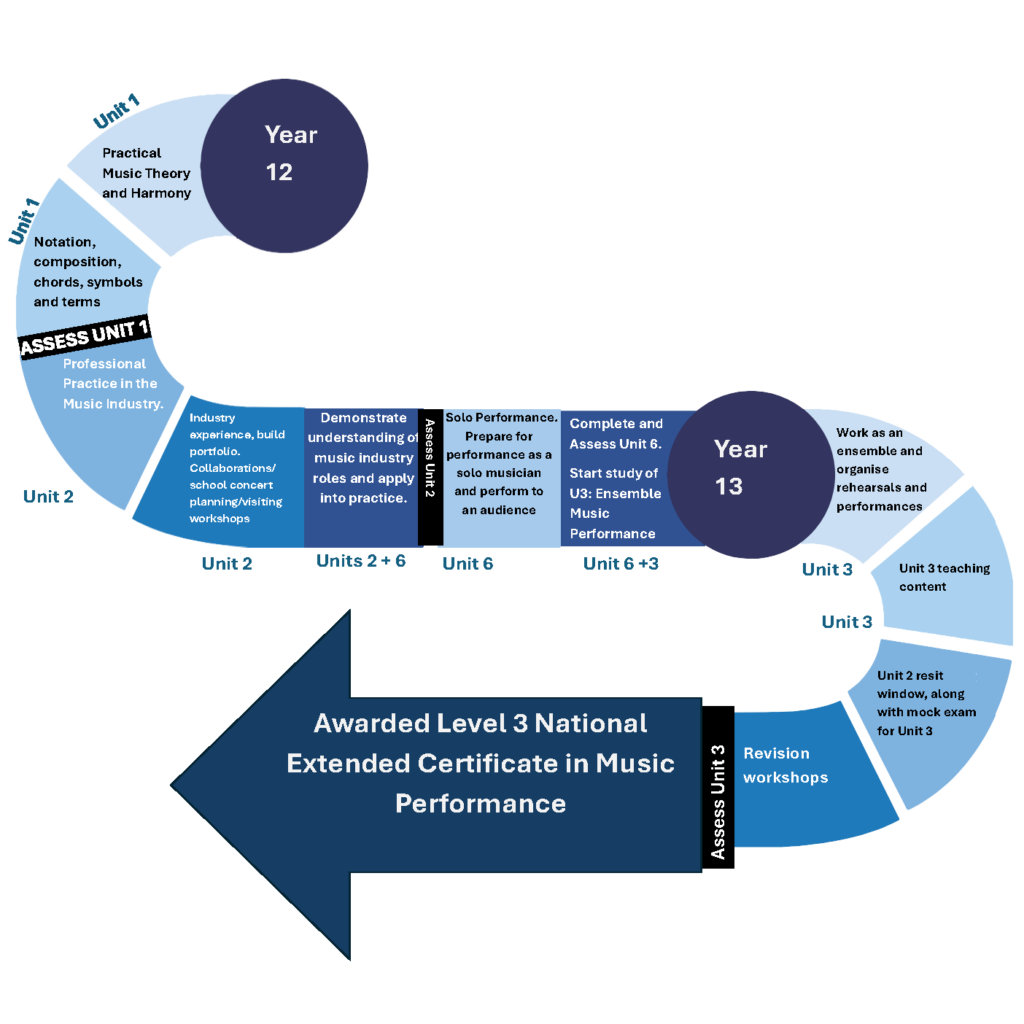Course Full Title: Pearson BTEC Level 3 National Extended Certificate in Music Performance
Exam Board: Pearson
Specification Code: 601/7090/6

The Pearson BTEC Level 3 National Extended Certificate in Music Performance enables learners to explore what it’s like to work in the Music sector and gain the underpinning knowledge and skills required to work in the industry. This is achieved by developing the learner’s key knowledge and understanding of the essential tools, techniques and equipment required, alongside an understanding of the idiomatic and stylistic features of a range of musical genres. Leaners will be supported in their journey to develop a range of musical products.
Learners continue from KS4 courses, to develop their performance skills (as solo and ensemble musicians, communicating musically with fluency), composing skills (organise musical ideas and make use of appropriate resources using technology) as well as develop an appreciation for diversity in musical styles, traditions through analysis of musical features and devices, through critical listening skills.
Year 12 is focused on the development of skills, knowledge and understanding and the course is taught in a synoptic style. Year 13 takes foundations from Unit 1 and 2 (in year 12) and focuses on the submission of assignments displaying ensemble musicianship skill (33%) and in the elected composition unit, students’ ability to compose a varied musical palette is assessed.
Entry Requirements
This course requires GCSE Music at Grade 3 or above, or equivalent experience as a musician/instrumentalist / music theory at Grade 4 or above.
The following units are studied:
Unit 1: Practical Music Theory and Harmony, 90 GLH, Mandatory, Internally Assessed/Externally Moderated
Unit 2: Professional Practice in the Music Industry, 90 GLH, Mandatory, Externally Assessed
Unit 3: Ensemble Music Performance, 120 GLH, Mandatory, Externally Assessed
Unit 6: Solo Performance, 60 GLH, Optional, Internally Assessed/External Moderation
Supporting your study
- Students need to immerse themselves in as many different styles and traditions of music and experience through media and live platforms as possible.
- Any music industry volunteering, performing or work experience will be highly beneficial. The course will offer opportunities for this, as and when available.
- Students need space and time to practice on their principal instrument, with an encouragement to practice 4-5 times 30 mins a week
Our approach to Teaching and Learning
- Lectures
- Group work
- Class discussion
- Study packs
- Individual reviews with your teachers
- Individual research
- Workshops
- Live performances
- Visits
What can this course lead to?
The qualification is intended to carry UCAS points and is recognised by higher education providers as it contributes to meeting admission requirements for many courses. It will support entry to higher education courses in a wide range of disciplines, such as:
- BA (Hons) in Performing Arts, Music Performance, Music Composition, Music Production or Music Business Management. These can then progress to Postgraduate qualifications in the same fields of study.
- Level 4/5 HNC/HND qualifications across various Music related subjects
Please see this link to the specification for more information and details: BTEC Nationals | Music Performance (2018) | Pearson qualifications
The curriculum map below details the specific content studied in each unit:









